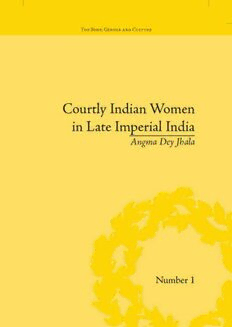
Courtly Indian Women In Late Imperial India PDF
255 Pages·2008·1.03 MB·English
Most books are stored in the elastic cloud where traffic is expensive. For this reason, we have a limit on daily download.
Preview Courtly Indian Women In Late Imperial India
Description:
Jhala examines the political worldview of courtly and royal women in India during the late colonial and post-Independence period. It is a history of the Zenana, which served as the 'women's courts' or 'female quarters of the palace', where women lived behind pardah (literally translating as the 'veil' or 'curtain') in seclusion. During the colonial period, Zenana women were significant players in matters of state succession, marriage alliance and the question of colonial law versus indigenous practice. In post-independent India, several former Zenana women entered electoral politics and occupied local and national seats of influence. The book crosses the divide between the public world of governance and politics and the private sphere of marriage, sexuality and female domesticity in the courtly household. It is a topic largely unexplored by current scholars of South Asia and gender studies.
See more
The list of books you might like
Most books are stored in the elastic cloud where traffic is expensive. For this reason, we have a limit on daily download.
